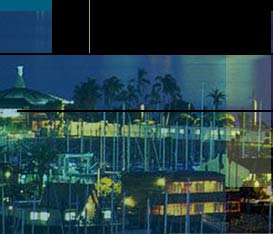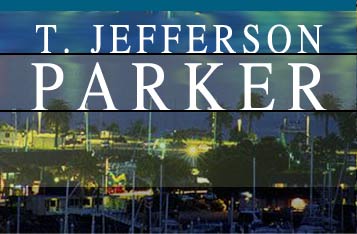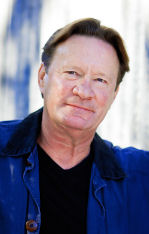 |
 |
 |
|
|
FAQ THE INNER WORKINGS OF TJP'S BRAIN
When did you first decide to become a writer? My "Mythology and Folklore" teacher in high school hated our class because we were troublemakers. One day she refused to teach us, and made us each close our eyes and pick a book out of a box she'd brought from home. We were to read silently all period. I got Catch 22 by Joseph Heller and I read it in a few days. I couldn't believe how funny it was, how hip and right-on. I told myself that if I could ever write something that would give someone 1/1000th the pleasure that Heller gave me, I'd be proud. Where do your plot ideas come from? What inspires you? The plots usually take shape in the writing or outlining stage. You create them, like a carpenter laying the foundation of a house. It's a gut feel, whether the story is good and the plot is right. I'm inspired by everything—the front page of the LA Times, a weird dream from the night before, an interesting story told by a friend, or even sitting at church. Snippets of conversation I overhear, things I see and experience, life itself—the mind drifts, hatching disastrous plots. But I'm inspired most of all by novels. There's something about a good, I mean a very good, novel, that sings straight into my heart. You have written many different kinds of characters but they all seem to share one thing—the loss of someone close to them, either through death or divorce. Why do you think this loss is a key factor in the makeup of your characters? Loss just seems to me such a common, universal thing. I mean in the end you're stripped of everything, even your heartbeat. And along the way you will lose many, many things. No one is immune. Everyone can understand it. Why does Southern California provide such prime locations for your novels? Orange County is the most densely populated county in California, home to people who live in poverty as well as billionaires. It has a long history as a place for entrepreneurs, "visionaries", hustlers and the like. Government is very friendly to business. Business basically runs the government, so the government is often corrupt. My book, SILENT JOE, deals with the bizarre marriage of commerce and government in Orange County. Laguna Beach, in particular, is a pretty little coastal town, and when I first moved there years ago it inspired LAGUNA HEAT and then LITTLE SAIGON. I still write about Laguna Beach, even though I don't live there anymore. My latest novels feature San Diego because I've moved nearby. I've found that city equally fertile ground for ideas. There's a real energy in SoCal, a real buzz—people are high energy, and feel very entitled to pursue their happiness with absolute vigor. Sometimes it's comic and sometimes it's criminal. Either way, plenty of good material. Will we see more Merci Rayborn novels, or have you plans to turn any of your stand-alone novels into series? Good question, and one which everybody asks. I thought Rayborn was a rich, challenging, still immature character and that she was left at the end of THE BLUE HOUR in a rather precarious circumstance which is why I wanted to continue her story in RED LIGHT and BLACK WATER. While I loved writing those three novels, right now I'm satisfied that her story has been told. I particularly enjoy writing stand-alone novels. Stand-alones demand a different kind of storytelling from a series novel, perhaps more complete than what is required for the episodic nature of a series. Right now, I don't plan to turn any of my previous novels into series but, as so many other authors have said, if one day I find those characters speaking to me, then I'll have to change my mind. Your novels have touched on pretty heavy stuff, like the Vietnam War, immigrants, police corruption, local politics, right wing extremist groups, child molesters, rapists, cancer, death, divorce. Is your intention to make a social or political statement with your novels? No, not really. I write about those things because I'm interested in them. I don't lecture or pontificate or make statements on those subjects, but I hope to make people think about them. Making people think—I think that's more valuable than rendering an opinion. Your very first book, LAGUNA HEAT was a bestseller and made into an HBO movie. How did you handle that kind of instant success? I was so young and dumb I thought that every book was a New York Times bestseller and got made into some kind of movie or TV program. I glided along on that handy belief until LITTLE SAIGON was published three years later. No bestseller. No movie. Critics hit it hard. Luckily, I was off and running on a new book by then, which became PACIFIC BEAT. One of the beauties of writing a novel is that it can be consuming. You just don't have time to worry about things that aren't directly related to the scene you're working on. What is a typical work day for you? I start around six-thirty and end around five, but that's not all writing. There's lunch, correspondence, all the business things you need to attend to. When it's going well I sometimes will write a full eight or nine hours—I just refuse to do anything else. When it's not going so well, that's when all the distractions become welcome and you'll use them to keep from the much harder work of putting together a story. What kind of books do you like to read? Any authors you can recommend? I love all kinds of books, so long as they're good ones. I'm a real fan of that generation of American novelists that falls between mine and that of Updike and Bellow. Which is to say Thomas McGuane, Jim Harrison, Richard Ford, Harry Crews. I love Gabriel Garcia Marquez, John LeCarre, Elmore Leonard, Norman Mailer, William Kittredge, John Gregory Dunne, Thomas Harris, and Jonathan Lethem to name a few. I finally read California Fire and Life, so Don Winslow is now on my list. His novel, The Power of the Dog is one I highly recommend. The list keeps growing and growing! What are your long-term goals as a writer? At the end of my life I'd like to hold one of my books in my hand and know that it is, in every applicable way, an excellent novel. Any advice for struggling writers trying to get a book written and published? I think it's important to read good books, if that's what you're trying to write. What you read is your nutrition, your creative diet. Don't be afraid to just sit down and write. Trust your muses if you're lucky enough to be visited by them. My advice is to work fast and read it later. Finish, finish, finish. If you read it later and don't like it, throw it away and start over. You know, the secret to writing is that generally speaking, it should be exciting, interesting, even—yes...fun. If it doesn't engage your sense of play and challenge and exploration, then you'll have a tough time finishing something. It's hard work. You huff and puff, but still, there should be exhilaration in it. When I write I kind of live for the next sentence—trying to find just the right thing to say, then the right way to say it. Also, don't think you have to write a whole novel in six weeks. If all you can steal is one hour a day to write, write a page a day and you'll have a 365 page manuscript in one year. The pages really do start to pile up. |